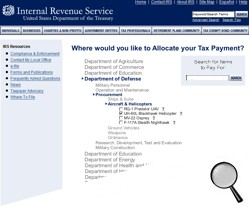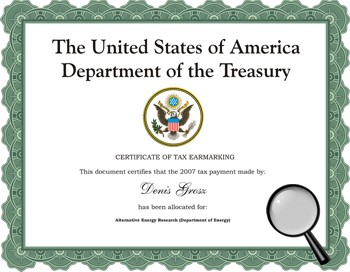What is Personal Tax Earmarking?
This plan would allow your tax payments to be specifically allocated for items like:
- Alternative energy research
- Building a new Nuclear Submarine
- Retrofitting a Stealth Bomber
- Repairing the Hubble Telescope
 |
 |
 |
 |
Each year untold millions of taxpayers begrudgingly file their taxes at the last possible moment. Amidst the complaints of overly complex regulations and excessive taxation, what could the IRS really do to make taxpaying less torturous?
We think we have come up with something that could help change taxpayers' attitudes. While it won't change the dollar amount that taxpayers owe, it may make the process significantly more engaging.
Our suggestion? Personal Tax Earmarking
Suppose that each government agency selected a certain portion of its budget to be paid at the choosing of the taxpayers. This means any individual could use the IRS website to navigate through budgets and line items for a wide variety of government agencies. Want to help buy a plane? Head to the Department of Defense. Want to finance a new episode of Sesame Street? Try the National Endowment for the Arts. Although this model could be applied to any government that collects and redistributes tax money, we've chosen to stick with U.S. income tax for our examples.
First-Come First-Served
Taxpayers who are interested in participating in the free program would be able to select items from the list on a first-come, first-served basis. They would log in via a web interface and choose the expenses that they wanted their tax payment to be earmarked for. Click the thumbnail below to see a possible screenshot of what taxpayers would encounter when they went to allocate their money:

Specificity of Choices
The granularity of the options in the database could be increased as the program gained traction. Imagine being able to say that your tax dollars helped fund an improved trail to Yosemite Falls or were allocated for paying elementary school teachers in your home town! Since government departments already make detailed budgets and procurement reports, its seems feasible that a taxpayer could earmark their payments for something as specific as a particular aircraft or a short stretch of highway. On the other hand, since most government projects are too expensive to be financed by just one taxpayer, the system could automatically count the combined contributions of many taxpayers to pay for the big-ticket items.
Advantages to Taxpayers
From a taxpayer's point of view, personal tax earmarking offers some great advantages. First, it would enable and encourage all taxpayers to become more informed about our national budget. Each agency would naturally choose to select their most appealing and visible projects for financing in this way, so that when taxpayers decide where to make their allocations, they will have the opportunity to learn about a wide variety of government-financed programs. Having a good idea of how the government spends their money may be a significant step towards encouraging citizens to hold politicians more accountable for their spending habits.
More than just enabling taxpayers to become more informed, this suggestion will actually allow citizens to take more personal ownership of the workings of government. Imagine a taxpayer who allocates their money to space research. Later in the year, they would receive an official certificate specifying how their taxes were spent. How great would it be to have a certificate on your wall thanking you for your part in paying for some NASA space project? Many taxpayers would proudly frame an official certificate that states that they helped pay for a stealth bomber or an environmental study to protect wildlife.
Advantages to the Government
Personal Tax Earmarking offers some significant advantages to the government as well. It is important to note that we're not suggesting that the citizens have the power to change the actual budget--we're leaving that to the elected officials. All the same, there's an upside to allowing the taxpayers the choice of where their money goes. A great thing about this model is that it would actually encourage interested individuals to file their taxes as early as possible, since once an item has been financed to its budgeted amount, it would no longer be available for earmarking. In this way, a taxpayer could ensure that they get first pick at financing the projects closest to their heart. As an example, anyone who attempts to allocate their taxes to the EPA's Superfund after it has been entirely paid for would be encouraged to choose something else--something they probably care about less. This would, in turn, encourage them to file their taxes earlier next year so that they will be assured the allocation of their choice. To the government, the advantage of this is that they could actually receive some tax money sooner and collect interest on it.Reduce the Tax Gap
Another possible benefit of income tax earmarking is that it could reduce the tax gap. The tax gap is the difference between the amount of tax money that the government has collected and what it is actually owed. According to some estimates, the tax gap is as much as $300 billion U.S. dollars a year. With citizens becoming more informed and taking ownership of government spending, the hope is that individuals might be less likely to underreport their income.
Engaged Citizenry
Finally, though it's impossible to quantify, every society benefits from an engaged citizenry. It's likely that encouraging active citizen participation could lead to individuals becoming more informed and involved in other ways.Naturally, participation in the tax earmarking program would be entirely optional, so no one would be forced to allocate their money if they didn't want to. Only a portion of the budget would be available for such earmarking, so latecomers would have to wait until the following year.
Generate Extra Revenue
Although some may criticize this idea as being an unnecessary waste of funds and effort, the program could actually generate more revenue for the government. Personal Tax Earmarking would promote early filings and reduce the tax gap; early tax filings and payments would give the government more time with the money which would generate increased interest income. The extra interest income would help pay for the negligible costs of the program.
The Government could require that people using this program must file electronically; this would serve as another incentive to file paperlessly. Additional electronic tax filers would further reduce paper handling costs and save money.
Improve Taxpayers' Attitudes
Imagine the shift in mentality when taxpayers discuss the cool things they have paid for instead of complaining about the tax codes and excessive tax rates. Although we should continue to pressure our elected leaders to be cautious with public funds, Personal Tax Earmarking could truly change the way people pay taxes! If you see the value in such a program, we encourage you to contact your local representative -- incorporating this idea into their platform just might get them more votes!
